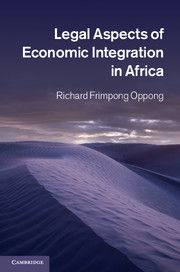Book contents
- Frontmatter
- Contents
- Tables
- Acknowledgements
- Table of treaties
- Table of cases (international/regional courts)
- Table of cases (national courts)
- Abbreviations
- Introduction
- 1 Africa's economic integration – an introductory overview
- 2 Legal framework for managing relational issues
- 3 The AU, AEC and regional economic communities
- 4 Community–state relations in Africa's economic integration
- 5 Relational issues before the community courts
- 6 AU/AEC institutions and the enforcement of community law
- 7 Implementing community law in African states
- 8 Inter-institutional relations: public–private international law dimensions
- 9 Interstate relations, economic transactions and private international law
- 10 Conclusion
- Bibliography
- Index
Introduction
Published online by Cambridge University Press: 05 July 2011
- Frontmatter
- Contents
- Tables
- Acknowledgements
- Table of treaties
- Table of cases (international/regional courts)
- Table of cases (national courts)
- Abbreviations
- Introduction
- 1 Africa's economic integration – an introductory overview
- 2 Legal framework for managing relational issues
- 3 The AU, AEC and regional economic communities
- 4 Community–state relations in Africa's economic integration
- 5 Relational issues before the community courts
- 6 AU/AEC institutions and the enforcement of community law
- 7 Implementing community law in African states
- 8 Inter-institutional relations: public–private international law dimensions
- 9 Interstate relations, economic transactions and private international law
- 10 Conclusion
- Bibliography
- Index
Summary
The piercing of national borders by transnational norms finds its strongest expression in the formation of regional communities of states which seek to develop a common fund of legal rules, concepts and principles among their members (Ulrich Scheuner, forward to C. J. Mann, The Function of Judicial Decision in European Integration (1971))
African states that have, for decades since their independence, held on to the idea of nation-state and national sovereignty appear to be on the path towards rejecting both. The immediate post-independence era saw a zealous assertion of national sovereignty by African states and attempts to develop stronger and more stable national institutions. In recent times, and with the resurgence of ‘African consciousness’ – African renaissance – calls have been made for the transfer of sovereignty away from the state to regional and continental institutions. National separatism is being abandoned in favour of regional and continental integration. Through numerous treaties, African states have positioned themselves on a path to economic integration. The route is complex, tortuous and fraught with social, economic, political and legal challenges. The ultimate goal is to create an African Economic Community (AEC). To get there, eight regional economic communities (communities) have been recognized by the African Union (AU) and given the mandate to progress gradually, ultimately with the view to merging to form the AEC.
- Type
- Chapter
- Information
- Legal Aspects of Economic Integration in Africa , pp. 1 - 5Publisher: Cambridge University PressPrint publication year: 2011



